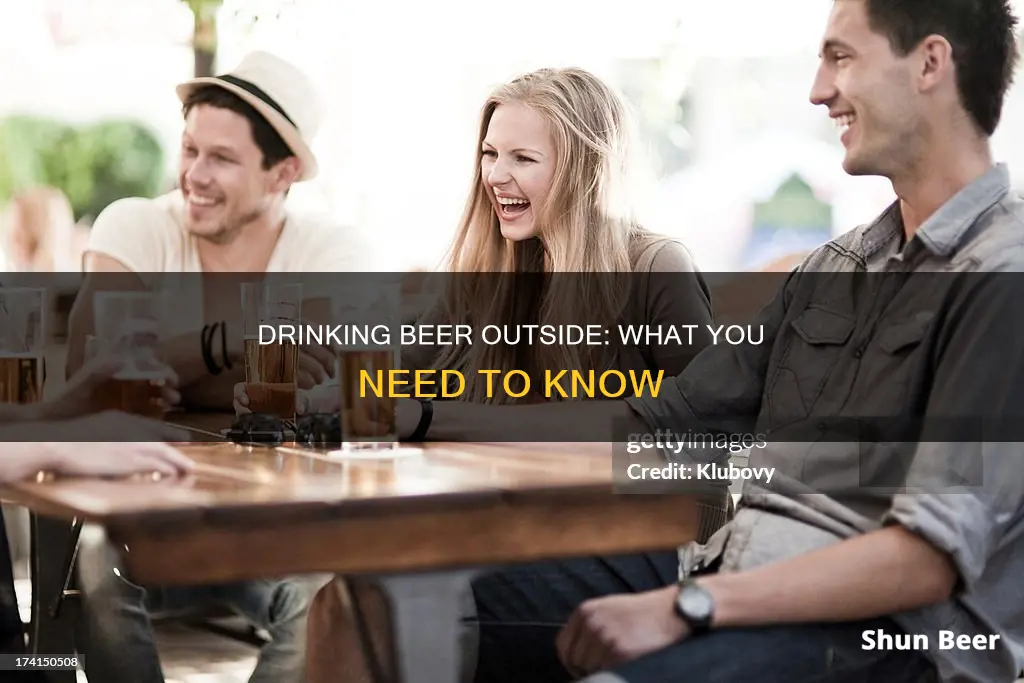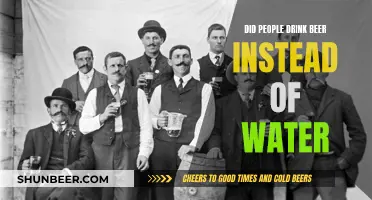
Drinking beer outside is a topic that sparks interest, especially as the weather gets warmer. However, public drinking laws vary across the world, with some countries and states allowing it, while others impose strict restrictions or bans. In the United States, for example, public drinking laws differ from state to state, with some states like California generally prohibiting drinking in public spaces outside licensed venues. On the other hand, cities like Las Vegas and New Orleans are known for their more relaxed open container laws, attracting tourists and contributing to the vibrant nightlife. These varying regulations highlight the importance of understanding local laws before indulging in outdoor drinking to avoid any legal repercussions.
Can you drink beer outside?
| Characteristics | Values |
|---|---|
| Drinking beer outside | Illegal in most jurisdictions in the U.S. |
| Drinking in public places | Illegal in places such as sidewalks, parks, stadiums, and beaches |
| Exceptions | Las Vegas Strip, some cities in Texas, New Orleans, and more |
| Open-container laws | Vary from state to state in the U.S. |
| Public drinking laws | Vary by community and are enforced by local governments |
| Public drinking penalties | Range from fines to jail time |
| Public intoxication | Considered a crime in some states |
| Underage drinking | Considered a misdemeanor in some states |
What You'll Learn

Drinking beer outside in the US
Some states, such as Indiana, Montana, and Oregon, have more lenient open-container laws, allowing consumption in public places like sidewalks. However, this may be restricted to certain cities or areas within the state. For example, in Oregon, only Hood River permits drinking on the sidewalks, while in Montana, the city of Butte allows drinking on the streets during specific hours (between 8 am and 2 am).
Additionally, some states have designated outdoor refreshment areas (DORAs) where alcoholic beverages are permitted. These can be found in cities like Tampa, Florida, where people can carry up to two drinks in plastic containers on the Tampa Riverwalk, and in Ohio cities like Canton, Delaware, and Hamilton, where specific areas have been established for outdoor drinking.
It's important to note that open-container laws can vary significantly, and some states may have unique stipulations. For example, in Fredericksburg, Texas, only beer and wine are permitted for outdoor consumption, and in Las Vegas, glass containers are prohibited on the Strip.
While drinking in public might be appealing, it's crucial to be mindful of local laws and regulations to avoid any legal issues. Additionally, it's important to drink responsibly and not cause disturbances or engage in unsafe behaviours like drinking and driving.
Beer and Keto: Can You Enjoy a Weekly Brew?
You may want to see also

Open-container laws
In the United States, open-container laws are state laws, and they vary from state to state. Most US states and localities prohibit possessing or consuming an open container of alcohol in public places, such as on the street. However, 24 states do not have statutes regarding the public consumption of alcohol.
The definition of "public place" is not always clear. For example, in California, there is a state law prohibiting possessing open alcoholic beverage containers in public places owned by a city or county, but it only applies to certain areas where the city or county has enacted a relevant ordinance.
Penalties for open container violations vary by state but can include fines, jail time, license demerit points, and community service.
Drinking and Driving: One Beer, Big Trouble
You may want to see also

Public intoxication
Drinking in public places—including sidewalks, parks, stadiums, and beaches—is considered illegal in most jurisdictions in the U.S. Penalties for drinking in public can range from steep fines to jail time. However, the laws vary depending on the state and even the city. For example, drinking in public is permitted in certain entertainment districts, such as the Las Vegas Strip, and some cities like Tampa, Florida, and Birmingham, Alabama.
In California, public intoxication is considered a misdemeanor under the California Penal Code 647(f). The code describes public intoxication as someone who is intoxicated by liquor, drugs, controlled substances, or toluene and demonstrates an inability to care for themselves or others, or interferes with the free use of streets, sidewalks, or other public ways. In Georgia, public intoxication is a class B misdemeanor, defined as a person who appears intoxicated in a public place or within the curtilage of a private residence, not their own, and manifests this through boisterousness, indecent condition or act, or by using vulgar, profane, loud, or unbecoming language. In Indiana, public intoxication is also a class B misdemeanor, punishable by up to 180 days in jail and a $1,000 fine. As of 2012, the person must also be endangering themselves or others, breaching the peace, or harassing, annoying, or alarming another person. Iowa's public intoxication law states that it is a simple misdemeanor, punishable by a maximum of 30 days in jail and a $1,000 fine. Aggravated public intoxication is considered an aggravated misdemeanor, with a maximum of 2 years in prison. In Texas, public intoxication is a class C misdemeanor, punishable by a fine of up to $500, and if the offender is a minor, harsher penalties may apply.
While public intoxication laws vary, there are usually three key elements to a public intoxication charge: the defendant must be under the influence of alcohol or drugs, they must have caused a disturbance or harm to themselves, another person, or property, and they must be in a public place.
Beer Drinking on Holden Beach: What's Allowed?
You may want to see also

Drinking beer outside in the UK
Firstly, it is important to note that drinking laws can vary between England, Wales, Scotland, and Northern Ireland. In England and Wales, there is no blanket restriction on drinking in public for those over the age of 18. However, local councils can implement Public Space Protection Orders (PSPO) to restrict alcohol consumption in specific areas associated with anti-social behaviour. These PSPOs give police officers the authority to confiscate alcohol and issue fines for non-compliance.
In Scotland, the regulations differ as each local council has its own set of by-laws that dictate where alcohol can be consumed in public. Many councils, like Glasgow, prohibit drinking alcohol or carrying open containers of alcohol in public spaces.
Northern Ireland also has unique drinking laws, with councils able to introduce by-laws to restrict alcohol consumption in certain areas or during specific events, such as parades.
It is worth noting that drinking in public places directly outside licensed premises or in council-designated no-alcohol zones is typically illegal across the UK. Additionally, drinking alcohol in public parks, roads, or walkways is generally permitted, but it is important to be mindful of local regulations as some councils may have specific restrictions in place.
When it comes to public transportation, drinking alcohol is banned on many services in the UK. For example, it is prohibited on Transport for London (TfL) services, including buses, trams, tubes, and the Docklands Light Railway (DLR). Similarly, alcohol consumption is not allowed on ScotRail train services in Scotland and Translink trains and buses in Northern Ireland. These restrictions are often enforced through the operator's terms and conditions, and non-compliance can lead to police involvement.
While drinking beer outside in the UK may be permitted in certain contexts, it is important to always be mindful of local regulations and to drink responsibly to avoid causing any disturbance or engaging in anti-social behaviour.
Calcium Channel Blockers and Beer: Is It Safe?
You may want to see also

Drinking beer outside in Europe
Germany
Germany generally permits drinking in public, including in parks, on the subway, or during your walk from the store. However, there are some restrictions. For example, drinking on public transportation networks is forbidden, and each city or municipality can impose its own restrictions. Berlin, for instance, is known for its liberal alcohol laws, while other German cities may have specific areas where public drinking is prohibited. It is also illegal to ride a bicycle while under the influence in Germany.
United Kingdom
The UK generally allows drinking in public by default, but there may be specific restrictions in certain areas. For instance, some places may have "alcohol control zones" where public drinking is restricted to address issues related to street drinking and disorder. However, enforcement may vary, and people are usually allowed to drink as long as they behave responsibly.
France
France has a more complex situation. While there are localized bans in certain places like train stations or bus stops, many people drink in public, and authorities may only intervene if individuals are causing significant problems. Interestingly, it is not illegal to consume wine or beer in the workplace in France, although this may depend on individual workplace policies.
Italy
In Italy, you can drink in public, but there are some unique provisions. For example, in Rome, public drinking is prohibited in groups of three or more, so drinking with one other person is permitted. Across Italy, drinking from glass containers in public is forbidden, and drinkers are expected to use plastic containers instead.
Greece
Drinking in public is legal in Greece, and tourists often drink as they sightsee. However, locals rarely drink in public and prefer moderation in their alcohol consumption. While public drunkenness is unlikely to result in a fine, it is frowned upon and considered offensive in Greek culture.
Czech Republic
The Czech Republic, known for its beer culture, generally permits drinking in public, specifically in its capital city of Prague. However, certain streets and areas, such as the nightlife district of Dlouha and Old Town, have strict no open container laws, and violating these restrictions can result in substantial fines.
Spain
Drinking in public is not allowed in Spain, but enforcement can be inconsistent, and many people still drink in public spaces, especially in tourist hotspots like Barcelona and Las Ramblas. If caught by the police, individuals may face hefty fines.
Sweden
Sweden has more restrictive alcohol laws. Spontaneous drinking can be challenging due to limited purchasing options for stronger alcoholic beverages. While "folk beer" (beer and cider under 3.5% alcohol content) can be bought in stores, stronger drinks are only available from dedicated state-owned alcohol shops called Systembolaget, which have limited opening hours and require buyers to be over 20 years old.
Finland
Public consumption of alcohol is forbidden in urban and suburban areas of Finland, but there are exemptions for public parks and beaches (excluding playgrounds). The police can also intervene if alcohol consumption causes a disturbance in public areas. While the law exists, it is rarely enforced, and many people drink in public parks during the summer months without issue.
Poland
Drinking in public is illegal in Poland, and those caught with an open bottle can be fined. However, enforcement may vary, and some people still drink in public spaces, especially in parks. The fine is relatively small, and people are unlikely to be bothered by the police as long as they are respectful and not causing a disturbance.
Denmark
In Denmark, you can drink in public as long as it adheres to local regulations, which must be clearly signed.
Serbia
In Serbia, individuals above the age of 18 can drink anywhere without legal restrictions.
Passengers and Beer: Drinking Laws You Need to Know
You may want to see also
Frequently asked questions
It depends on the state and local laws. While the majority of U.S. states prohibit drinking in public places, some states like Indiana, New Orleans, Las Vegas, and Indianapolis allow drinking in almost all outdoor areas. Some states also have specific cities or entertainment districts where drinking outside is permitted, such as Tampa, Florida, and Kansas City, Missouri.
Open-container laws prohibit drinking alcohol in public and possessing open alcoholic beverage containers in certain areas. These laws vary from state to state and aim to restrict public intoxication and drunk driving.
Penalties for drinking outside where it is prohibited can vary from state to state and may include fines, jail time, license demerit points, and community service. In California, for example, drinking in public is an infraction that carries a ticket and a fine of up to $250.







